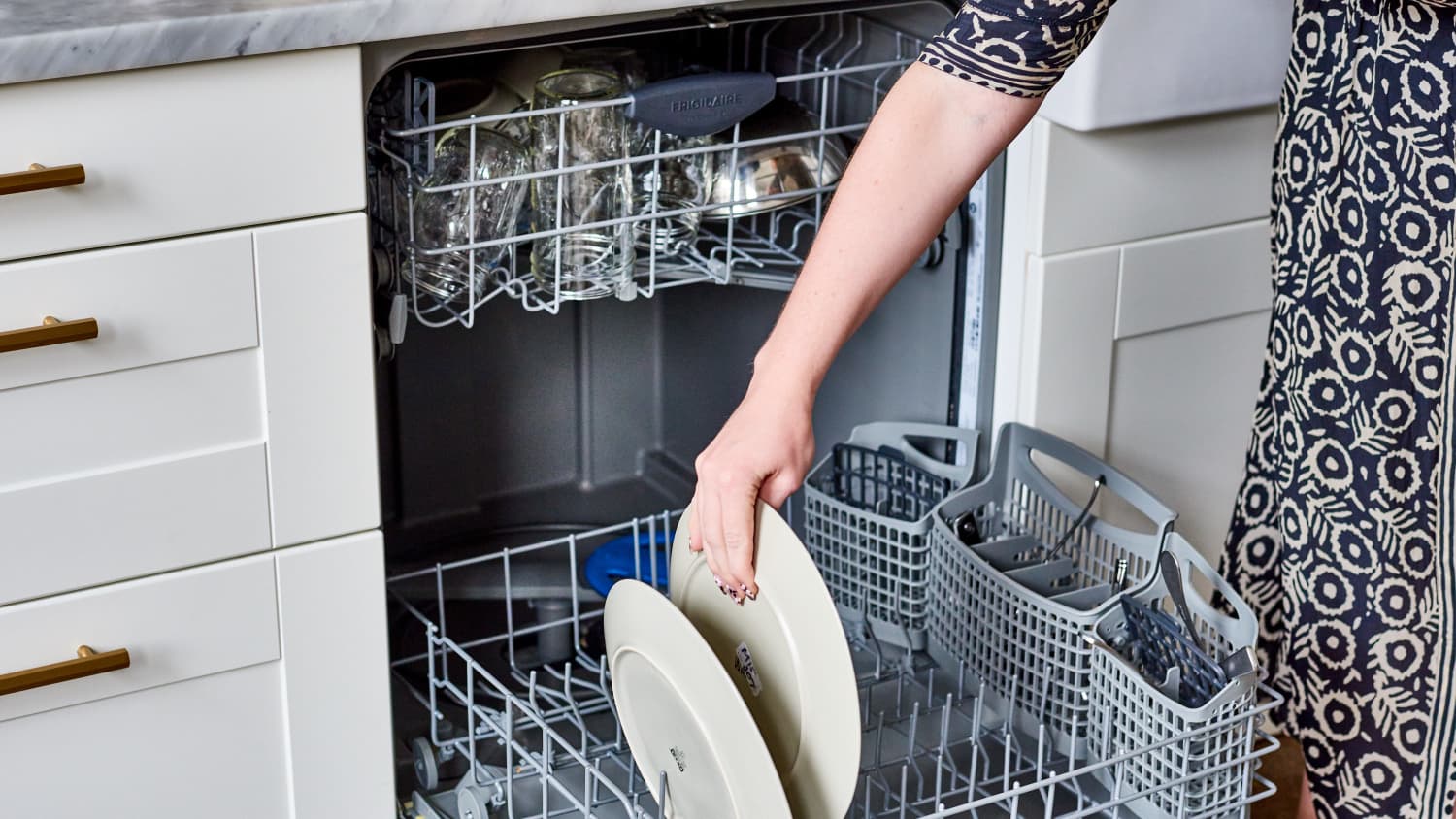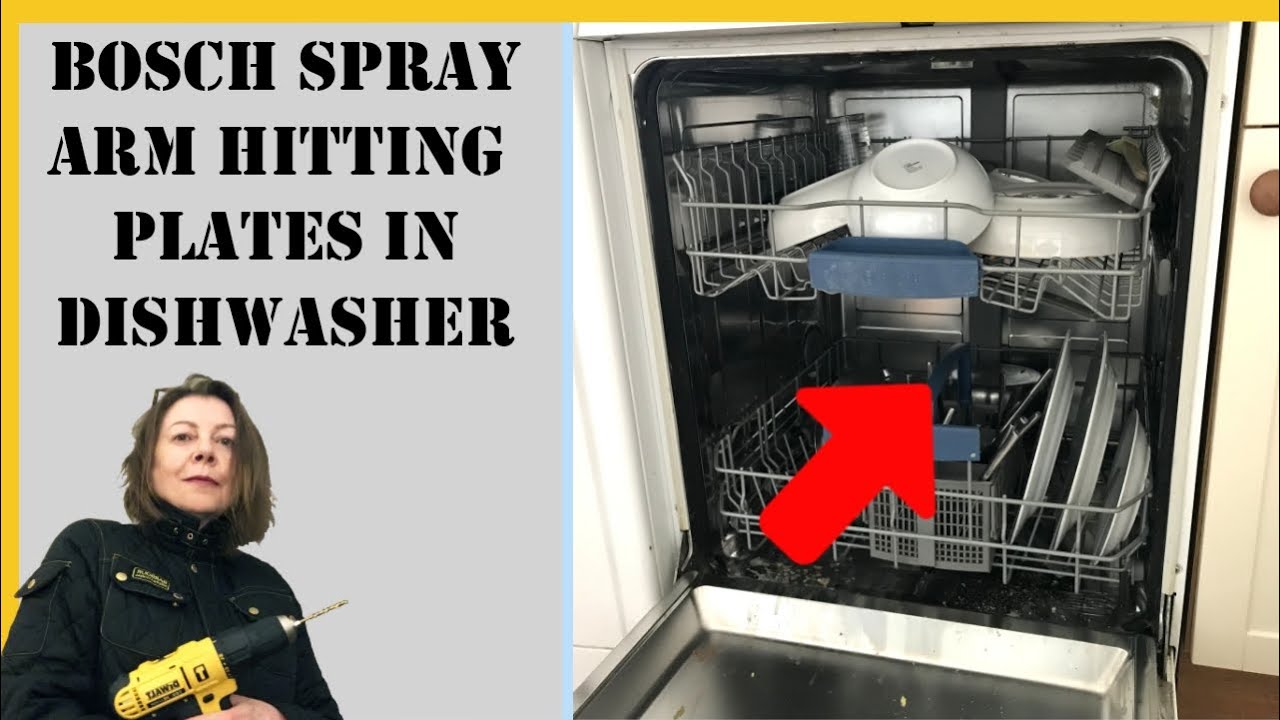
Is your dishwasher spray arm constantly getting clogged? Frustrating, isn’t it? Well, worry no more! In this article, we will provide you with some effective tips to prevent and fix those pesky spray arm blockages. With these simple yet highly practical solutions, you’ll be able to keep your dishwasher running smoothly and your dishes sparkling clean. Say goodbye to the hassle of dealing with blockages and say hello to hassle-free dishwashing!
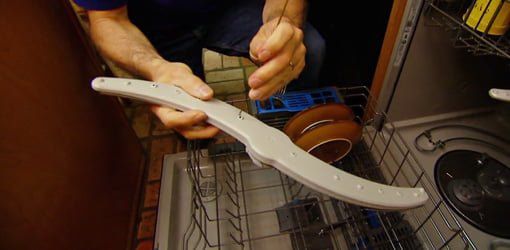
This image is property of s43635.pcdn.co.
Regular Cleaning
Regular cleaning is essential to maintain the efficiency and effectiveness of your dishwasher. By following a few simple steps, you can ensure that your dishwasher performs optimally for years to come.
Remove and Soak the Spray Arm
The spray arm is responsible for distributing water throughout the dishwasher to clean your dishes. Over time, it can become clogged with food particles and debris. To remove the spray arm, simply twist it counterclockwise and lift it off. Soaking it in warm soapy water for about 15 minutes will help to loosen any buildup. After soaking, rinse the spray arm with clean water to remove any remaining residue.
Clean the Spray Arm Holes
While the spray arm is removed, take the opportunity to clean the holes on the underside. These holes can easily become blocked, preventing proper water flow. Use a toothpick or a small brush to gently remove any debris from each hole. This will ensure that water can flow freely through the spray arm and effectively clean your dishes.
Clean the Filter
The dishwasher filter plays a crucial role in preventing food particles from clogging the spray arm and other components. It is important to clean this filter regularly to maintain its effectiveness. Refer to your dishwasher’s manual to locate the filter and remove it. Rinse it under warm water to remove any trapped debris. If the filter is particularly dirty, you may need to use a soft brush to scrub off stubborn residue.
Check the Drain Hose
The drain hose is responsible for removing the dirty water from your dishwasher. If it becomes clogged or damaged, it can lead to poor drainage and blockages. Inspect the drain hose for any kinks, bends, or obstructions. If you notice any issues, try straightening the hose or removing any blockages manually. Ensuring that the drain hose is clear and in good condition will help prevent blockages and keep your dishwasher running smoothly.
Avoiding Blockages
Preventing blockages in your dishwasher is key to maintaining its performance and avoiding costly repairs. By following these simple tips, you can minimize the risk of blockages and keep your machine running smoothly.
Scrape Excess Food
Before loading your dishes into the dishwasher, be sure to scrape off excess food and debris. Large food particles can clog the spray arm and other components, leading to blockages. By taking a few seconds to remove any leftover food, you can greatly reduce the risk of blockages and ensure that your dishes come out sparkling clean.
Avoid Overloading
It can be tempting to cram as many dishes as possible into your dishwasher, but overloading can lead to poor performance and blockages. Overcrowding the dishwasher prevents water from reaching all areas effectively, resulting in dirty dishes and potential blockages. Be sure to leave enough space between items for water to circulate freely and clean your dishes thoroughly.
Pre-rinse the Dishes
While dishwashers are designed to handle dirty dishes, heavily soiled items can still cause blockages. Pre-rinsing your dishes before loading them into the dishwasher can help prevent food particles from accumulating and causing issues. Simply give your dishes a quick rinse under running water to remove any excess food, and your dishwasher will thank you.
Use the Right Detergent
Using the correct dishwasher detergent is crucial for preventing blockages and achieving optimal cleaning results. Be sure to choose a detergent that is specifically formulated for use in dishwashers. These detergents are designed to dissolve food particles and prevent them from clogging your machine. Using the right detergent will not only help prevent blockages but also prolong the lifespan of your dishwasher.
Properly Load the Dishwasher
The way you load your dishwasher can also impact its performance and the likelihood of blockages. Be mindful of how you position items to ensure that water can reach all surfaces. Avoid stacking dishes or placing them too close together, as this can impede water flow and result in blockages. Following the manufacturer’s instructions on how to load your particular dishwasher model can help prevent any potential issues.
This image is property of cdn.apartmenttherapy.info.
Ensuring Proper Water Flow
Proper water flow is vital for a well-functioning dishwasher. A lack of water pressure or a clogged water inlet valve can lead to blockages and prevent your dishes from getting clean. Here’s how you can ensure that water flows smoothly in your dishwasher.
Check Water Pressure
Inadequate water pressure can hinder the performance of your dishwasher and lead to blockages. Make sure that the water supply to your dishwasher is turned on fully and that the water pressure is at an appropriate level. If you suspect low water pressure, you may need to consult a professional or your local water supplier to address the issue.
Unclog the Water Inlet Valve
The water inlet valve controls the flow of water into your dishwasher. If this valve becomes clogged or blocked, it can disrupt water flow and cause blockages. To unclog the water inlet valve, turn off the dishwasher’s power supply and locate the valve. Using a small brush or toothbrush, gently clean the valve to remove any debris. Once the valve is clean, restore power to the dishwasher and check if the water flow has improved.
Inspect the Water Pump
The water pump circulates water throughout your dishwasher, ensuring that dishes are thoroughly cleaned. A malfunctioning water pump can lead to blockages and poor performance. To inspect the water pump, locate it in the bottom of the dishwasher and remove any debris that may be blocking it. If the pump appears to be damaged or faulty, it may need to be replaced. Consult a professional if you are unsure how to proceed.
Using Vinegar
Vinegar is a versatile household product that can be used to clean and maintain various appliances, including dishwashers. By incorporating vinegar into your dishwasher maintenance routine, you can help prevent blockages and keep your dishwasher running smoothly.
Vinegar Soak
To give your dishwasher a thorough clean and remove any built-up residue, try a vinegar soak. Start by removing any dishes and racks from the dishwasher. Place a cup of white vinegar in a dishwasher-safe container on the top rack of the empty dishwasher. Run a full cycle on the hottest setting. The vinegar will help to break down any grease and grime, preventing blockages and leaving your dishwasher fresh and clean.
Vinegar Rinse
For regular maintenance and prevention of blockages, you can use a vinegar rinse. Simply place a small cup or bowl filled with white vinegar on the top rack of your dishwasher before running a normal cycle. The vinegar will help to remove any residual detergent and mineral deposits, ensuring optimal water flow and preventing blockages.
Vinegar and Baking Soda Mixture
For stubborn stains or lingering odors in your dishwasher, a vinegar and baking soda mixture can work wonders. Sprinkle a generous amount of baking soda in the bottom of your dishwasher and pour half a cup of vinegar over it. Let the solution sit for about 15 minutes to allow the vinegar and baking soda to work their magic. Afterward, run a normal cycle on your dishwasher to rinse away the mixture and leave your dishwasher fresh and odor-free.

This image is property of thecheeryhome.com.
Removing Blockages Manually
Despite your best efforts to prevent blockages, they can still occur occasionally. If you notice any signs of blockages, it’s important to address them promptly to avoid further damage to your dishwasher. Here are some simple methods for manually removing blockages.
Unclog with a Toothpick
If you notice any debris or food particles stuck in the spray arm or spray arm holes, a toothpick can be a handy tool for unclogging them. Gently insert the toothpick into the blocked area and use it to dislodge the debris. Be careful not to apply too much pressure or use a sharp object that could damage the dishwasher components.
Clear with a Wire
In cases where blockages are more severe, a thin wire can be used to clear them. Straighten a wire, such as a paperclip, and gently insert it into the affected area. Move the wire back and forth to dislodge any debris. Again, exercise caution to avoid damaging the dishwasher.
Rinse with Hot Water
If you suspect a blockage in the drain hose or any other component that can be easily detached, rinsing it with hot water can help remove the obstruction. Disconnect the affected part and flush it with hot water from a faucet or kettle. The hot water will help to loosen and wash away any blockages, restoring proper water flow.
Inspecting and Replacing Parts
Regular inspection of your dishwasher’s components is important for identifying any issues and preventing blockages. Certain parts may wear out or become damaged over time, leading to poor performance and potential blockages. Here’s what you should focus on when inspecting your dishwasher.
Check the Spray Arm Assembly
The spray arm assembly is responsible for distributing water throughout the dishwasher. Inspect it for any cracks, clogs, or signs of damage. If you notice any issues, the spray arm assembly may need to be replaced. Consult your dishwasher’s manual or a professional for guidance on obtaining and installing a new spray arm assembly.
Examine the Filter
As mentioned earlier, the filter plays a vital role in preventing blockages. Regularly examine the filter for any signs of damage or excessive buildup. If the filter appears worn out or is no longer effectively trapping food particles, it should be replaced. Refer to your dishwasher’s manual for instructions on how to replace the filter or seek assistance from a professional.
Inspect the Drain Hose
The drain hose ensures efficient drainage of dirty water from your dishwasher. Look for any kinks, bends, or tears in the hose that may be obstructing the flow. If you notice any damage, the drain hose may need to be replaced. Contact the manufacturer or a professional to obtain a replacement drain hose and ensure it is installed correctly.
Evaluate the Water Inlet Valve
A faulty water inlet valve can disrupt water flow and lead to blockages. Evaluate the valve for any signs of damage or malfunction. If it is not functioning properly, it may need to be replaced. Consider contacting a professional to assess and replace the water inlet valve if necessary.
Test the Water Pump
The water pump is an integral part of your dishwasher’s operation. If you suspect that the water pump is not working correctly, a professional can perform a diagnostic test to determine if it needs to be repaired or replaced. It is important to address any issues with the water pump promptly to prevent further damage and blockages.
Replace Faulty Parts
If you discover any damaged or faulty parts during your inspection, it is crucial to replace them promptly. Using malfunctioning components can lead to poor performance, blockages, and potential damage to your dishwasher. Consult your dishwasher’s manual for specific instructions on replacing parts or seek professional assistance if needed.
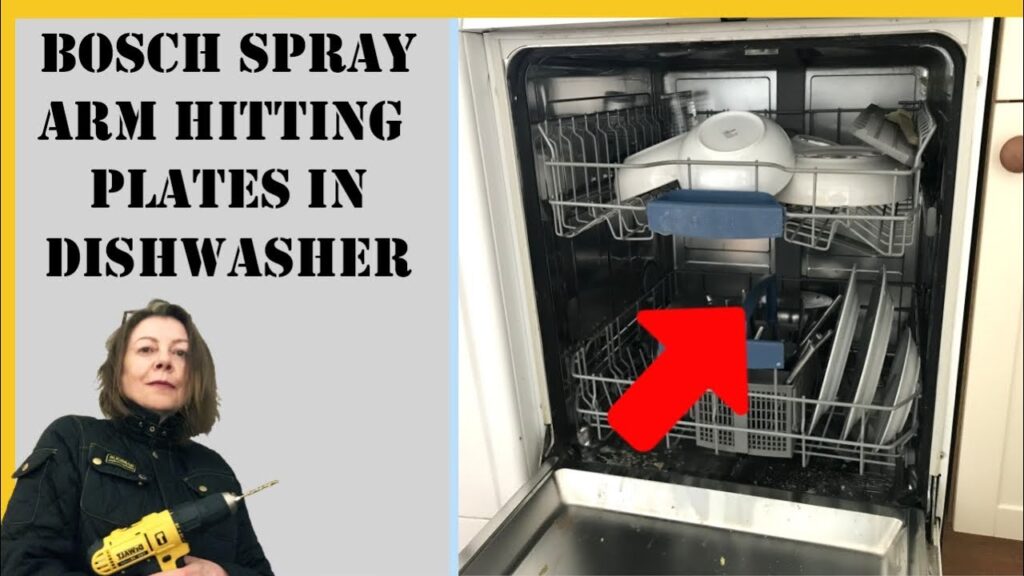
This image is property of i.ytimg.com.
Seeking Professional Help
While many dishwasher maintenance tasks can be done by yourself, there may be situations where professional help is required. If you encounter persistent blockages or any issues beyond your expertise, it is best to seek the assistance of a repair service or contact the manufacturer directly.
Contacting a Repair Service
If you have tried various troubleshooting methods and are still experiencing blockages or poor dishwasher performance, it may be time to call a professional repair service. They have the knowledge and expertise to identify and resolve complex issues quickly and efficiently. Professional repair services can help ensure that your dishwasher is in the best possible condition and prevent further damage.
Consulting the Manufacturer
The manufacturer of your dishwasher is a valuable resource for troubleshooting and support. If you are unsure about a specific issue or need guidance on replacement parts or repairs, consult the manufacturer’s support team. They can provide you with detailed information and assistance to help you overcome any problems you may encounter with your dishwasher.
Taking Preventive Measures
Prevention is always better than cure, and the same applies to dishwasher blockages. By taking a few preventive measures, you can reduce the risk of blockages and extend the lifespan of your dishwasher.
Regular Maintenance
Implement a regular maintenance routine for your dishwasher, including cleaning the spray arm, filter, and other components as needed. By keeping your dishwasher clean and free from debris, you can minimize the chances of blockages and ensure optimal performance.
Checking Water Quality
The quality of the water you use in your dishwasher can impact its performance and lead to blockages. If you live in an area with hard water, mineral deposits can build up over time and obstruct the flow of water. Consider using a water softener or installing a water filter to improve the quality of the water entering your dishwasher.
Cleaning the Dishwasher Interior
In addition to regular cleaning of the spray arm and filter, it is important to clean the interior of your dishwasher. Wipe down the interior walls and door with a damp cloth to remove any residue or buildup. Pay special attention to the bottom of the dishwasher, where debris can accumulate and cause blockages.
Avoiding Hard Water Deposits
Mineral deposits from hard water can accumulate in your dishwasher over time and lead to blockages. To prevent this, consider using a dishwasher cleaner specifically designed to remove hard water deposits. Follow the instructions on the cleaner to effectively remove any buildup and maintain optimal water flow.
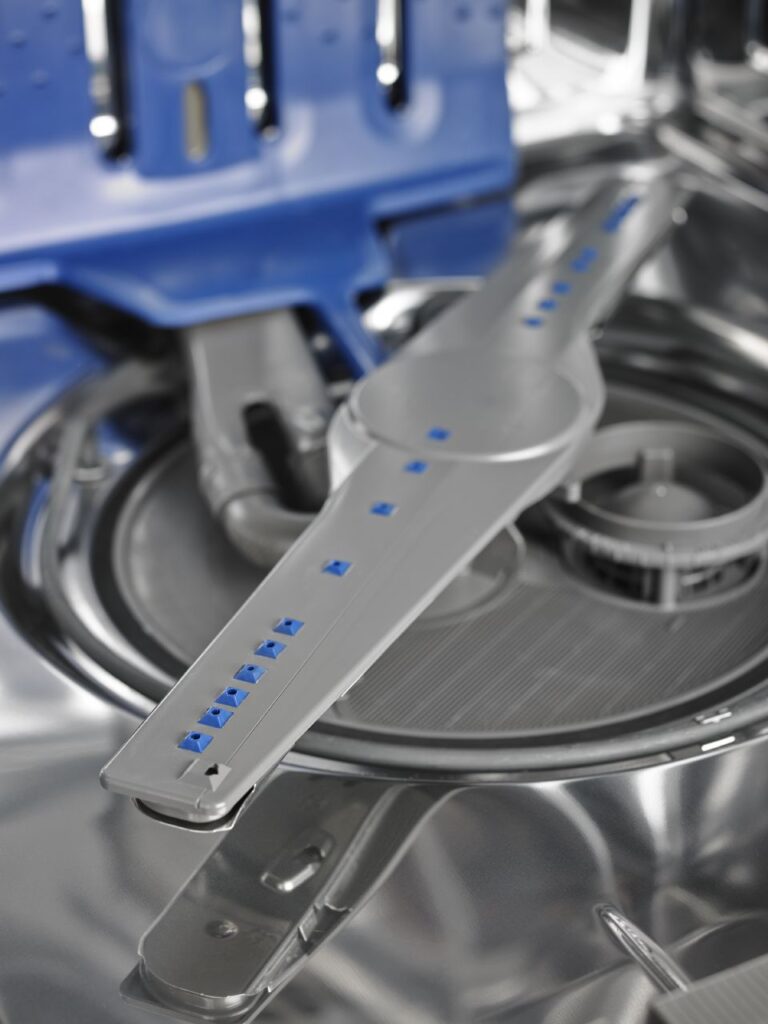
This image is property of ars.repair.
Common Signs of Blockages
Identifying the signs of blockages in your dishwasher is crucial for prompt action and prevention of further damage. If you notice any of the following signs, it is likely that blockages are present and require attention.
Weak Water Flow
A decrease in water flow during a dishwasher cycle can indicate a blockage in the spray arm or other components. If it seems like your dishwasher is not getting enough water to properly clean your dishes, it is important to investigate and address the issue promptly.
Incomplete Cleaning
If your dishes are coming out of the dishwasher still dirty or with visible food particles, it may be a sign of blockages in the spray arm or filter. Blockages prevent proper water flow, resulting in inadequate cleaning performance. Take immediate action to remove any blockages and restore your dishwasher’s cleaning power.
Spotty Dishes
Spots or streaks on your dishes after a dishwasher cycle can indicate a blockage in the spray arm or an issue with water distribution. Check the spray arm and spray arm holes for any clogs or debris that may be causing uneven water flow. By addressing the blockages, you can achieve spotless dishes once again.
Strange Noises
Unusual noises coming from your dishwasher during a cycle can be a sign that something is amiss. Blockages can cause the spray arm or other components to work harder than usual, resulting in strange sounds. If you notice any unusual noises, investigate the cause to determine if blockages are present.
Conclusion
Regular maintenance and preventive measures are vital for ensuring the proper functioning of your dishwasher and preventing blockages. By following the guidelines outlined in this article, you can keep your dishwasher in optimal condition, achieve spotless dishes, and avoid costly repairs. Remember to clean the spray arm, filter, and other components regularly, use the right detergent, and load the dishwasher properly. Inspecting and replacing faulty parts, if necessary, is also crucial. If blockages persist or if you encounter any other issues, do not hesitate to consult professionals or contact the manufacturer for assistance. By applying the provided tips and maintaining your dishwasher diligently, you can enjoy the benefits of a reliable and efficient dishwasher for years to come.
